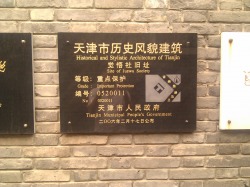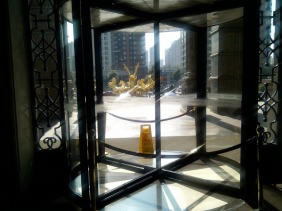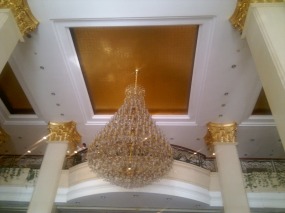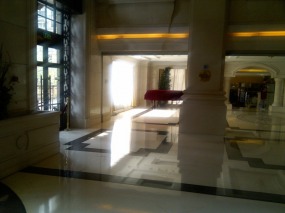It seemed reasonable to give myself a week or so to adjust. Being thrown into this new situation with a handful of insane FSU students after a couple months of nothing but debauchery, a certain level of slacking was to be expected. However, that adjusting period needs to have run it's course. Leveling out entirely would include some things that just aren't going to happen, but I'm putting forth a full fledged effort to do that which may be reasonably expected. One big aspect of it all is settling into a schedule. Up at 7am, school until noon, lunch, cool shit around town, take care of day to day things / sit around doing jack shit, dinner, study / sit around doing jack shit, sleep.
Today my cool thing was checking out a Buddhist temple and then trying to find a Jewish temple. I had been led to believe that Tianjin had a vibrant Jewish community at one point and that there was a synagogue here which may or may not have been torn down. My hopes tempered, when something called Tianjin Jueweushe Memorials showed up on my google phone I was pretty psyched. After many hours of googling and wiki-ing it had just fallen into my lap. So after checking out the temple of great compassion I set out for the temple of lox and dumplings. It was interesting getting there. The Google phone is pretty amazing, but the GPS has limitations when it comes to traveling on foot. So it served as more of a map. After walking back and forth down a street for a little bit it seemed that I was in the right place. Nothing looked like a synagogue, but there was an alleyway and it was definitely toward the dot on google maps... so I walked down it. There were more than a few stares and "Ni hao" didn't get a response or even a friendly smile in return. This was definitely not it. But it was old and there was a plaque, so it wasn't a total loss. Hopefully my professor will have some idea of what the plaque means so I can get an idea of what it was I was looking at.
[Update: according to Dr. Lan this is an area where a communist youth organization would gather prior to the formation of the PRC]
Even during an extended stay traveling somewhere is markedly different from living there. When traveling there are a plethora of resources at one's fingertips (read: concierge) and requirements for day to day life are less. There is no need to furnish one's living space and when public transportation is lacking, taking cabs isn't a problem. I've been in Tianjin for a little over a week. Many who are just passing through will spend longer than that. But because my situation is living and not traveling it gives me a different perspective. Hotels will give you deodorant. Chinese language universities will not. When traveling, lack of internet (and when you have internet lack of social networking websites, youtube and a handful of other websites) is a minor inconvenience. In my situation it leaves me cut off from at least 20 people who I would like to be in touch with.
My stay has thus far been fraught with difficulties. All transactions in China are needlessly complex, even when you're with someone who was born and raised in the country. Getting my cell phone was absolutely insane. Paying the bill should be a little simpler, but we'll see how it goes down. I just left the school with a list of about nine items I needed to buy and came back with two. Most of the items were due to not being in the right place (figuring out where to go will be interesting) but some were due to systemic issues. The largest size shoe the store had was like three sizes too small.
But beyond such hurdles, the nature of my time here creates further difficulties. There are certain items I use day to day, for instance an iron and ironing board. And unfortunately when you add all of the items up, even with monopoly money exchange rates, it comes out to be a figure too sizable to be justified by a six (now five) week stay. So I can't have any food that needs to be refrigerated. Nor can I have anything hot after the cafeteria closes. In terms of getting around the subway system in Tianjin is lacking. The Chinese government pours money into infrastructure like methanol into a top fuel dragster. The subway system in Beijing is beyond sick. But the lines under construction here are still a few years away. This leaves me in the position of needing a bicycle. It would come out to be about 40 U.S. (brand new), but the hassle of getting it will be immense (how does one explain frame size to the non-English speaking staff of the Chinese Wal-Mart equivalent?) So my standard of living is garbage for the next few weeks. My diet is unhealthy, and my mobility and ability to accomplish tasks are both severely limited.
Yet the question of if I could live here is still up in the air. If my stay was a year or two instead of six weeks my living situation would be normalized. After a few months I would learn how to get around. And learning the language to the extent required to accomplish day to day tasks wouldn't be all that difficult. Two or three months of study would do it.
Opportunities abound in China. For instance, I recently stayed at a Howard Johnson. The hotel was palacial. Marble floors, huge lobby, giant statue of a chariot and three horses in the middle of a fountain out front (probably 4x scale). We didn't believe it could be our hotel when we pulled up. When we found out it was we could only assume HoJo was a different type of chain in Asia. But the service was garbage and facilities slightly worn. We had to switch rooms two times due to the first two having broken air conditioners. The staff practically accused us of lying about the A/C being broken, sent a maintainence crew to the first one and then in the second room tried to bring a fan up to solve the problem. At that point I went downstairs and flipped on the manager. Ultimately our room was not free or even half price. We didn't get free breakfast and emergency calls to my bank at the business center that the Marriott probably would have given me for free cost us $20. It taught me two things. The first is that things are moving and being built so fast in China that a 20 or 30 year old palace like that isn't even worth renovating. Instead they just turn it into a three star Howard Johnson. The second was pointed out by a friend of mine. China needs Westerners even if they don't speak the language. That HoJo was badly vacant in spite of a rock bottom price. The reason is because when someone tells the manager "After the service I've received here I cannot ever stay at a Howard Johnson again" he just apologizes and doesn't offer anything to try and get return business. Even at the Marriott there were a handful of times things were simply done wrong, opportunities to make money missed out on and flagrant misunderstandings.
China is still developing and there's a need for westerners to help and show the Chinese how to deal with the developed world and other westerners. From my experience with that HoJo someone skilled in the hospitality industry could in all likelihood be living verrrry comfortably working for an upscale hotel chain. I would assume this is true across the board. China seems to be the wild west (or east) of capitalism and anyone can make their way. As an FSU alum who has been living here for two years told me right after I arrived in Tianjin, you've just got to be hungry.
TFSU is the opposite of FSU. I've been told that within the last decade FSU spent $50 million to renovate the campus. Building largely on the architectural malaise of the late 1960s and 1970s some very gifted (and presumably highly paid) people crafted a gorgeous campus. When walking outside Bellamy on a sunny north Florida day you can't help but smile, basking in the understanding that such little moments are what makes life grand. TFSU exemplifies the architectural style of Tianjin. Occupied by the eight power allied forces during and after the boxer rebellion there is a lingering turn of the century western motif. But whereas all over Tianjin there are construction crews busily conquering the sky, earthmoving equipment on the TFSU campus sits dormant. Weeds grow from the cracks in the sidewalks and grassy areas are brown. The juxtaposition of the elegance of the original buildings, faux elegance of their newer counterparts and the spartan living conditions is off putting. To top it off, there are no sunny days in Chinese cities. Tianjin is vastly better than Beijing (I didn't realize the area of town I was staying in was populated by grand skyscrapers until the last day, even though my hotel room was on the seventh floor), but you still cannot tell that the sky is blue. [edit: this was the case when originally written, but the past four days have been sunny and on three of them you could even make out whispy clouds. however, this is not the norm and pretty much everyone has been amazed]
There is another difference as well. I can't tell for sure due to the language barrier, but it's a general vibe I get. American universities are packed with students who share a sense of entitlement. There are no blackout drunk sorority girls falling off of their $500 heels at three in the morning here. I cannot speak to exactly how studious the student body is, but they do seem to take education more seriously than their American counterparts. The United States has the greatest university system in the world, but the students here are hungrier. Of course, that may just be my predisposition to western self loathing talking.





 RSS Feed
RSS Feed